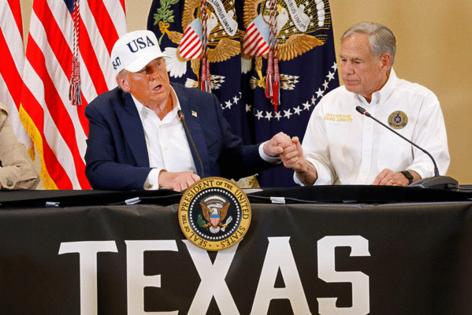Were Texas flood deaths avoidable? Here's what Americans said in a new poll
Published in News & Features
Many Americans believe the deaths caused by recent floods in Texas could have been prevented, and most think that the government’s response was imperfect, according to new polling.
The YouGov/Economist survey — conducted July 11-14 — comes after central Texas was pummeled by flash floods beginning on July 4, when the Guadalupe River surged over its banks, sweeping away homes and leaving at least 134 dead and about 100 missing, ABC News reported.
Among the worst affected areas was Camp Mystic, a Christian camp in Kerr County, where NBC News reported 27 campers and counselors lost their lives.
President Donald Trump traveled to Texas on July 11 and met with the families of victims. He said he wished to express “the love and support and the anguish of our entire nation,” CBS News reported.
“I’ve never seen anything like it,” he added, “a little narrow river that becomes a monster…”
In the aftermath of the devastating disaster, multiple organizations and individuals have faced scrutiny over their preparedness.
Among them were Kerr County officials, who did not install a comprehensive flood warning system despite being aware of its necessity, according to the Texas Tribune.
The Federal Emergency Management Agency (FEMA) has also faced criticism over its response, and the New York Times reported that it failed to answer thousands of calls from Texas flood survivors
Here is a breakdown of the findings.
Were deaths avoidable?
In the survey — which sampled 1,680 U.S. adults — 52% of respondents said that most of the deaths could have been prevented if the government had been more adequately prepared. Twenty-nine percent said the deaths were unavoidable, and 19% said they didn’t know.
On this question, there was a sizable partisan divide. Most Democrats and independents — 74% and 53%, respectively — called the deaths avoidable, while just 28% of Republicans said the same.
Government response
The poll — which has a margin of error of 3.4 percentage points — also asked respondents to judge the government response to the flooding.
A plurality, 38%, labeled the overall government response as poor, while smaller shares described it as fair (14%), good (19%) or excellent (14%).
Individual officials received somewhat similar marks.
When asked about Trump’s response, 42% said it was poor, while fewer said it was fair (11%), good (15%), and excellent (21%).
Meanwhile, 36% said Homeland Security Secretary Kristi Noem’s response was poor. Eight percent said it was fair; 14% said it was good and 13% said it was excellent.
Additionally, respondents were asked about presidents visiting disaster sites (the survey began on the day Trump traveled to Texas).
A majority, 64%, said presidents should visit locations of disasters because it demonstrates their solidarity. Just 17% said they should not do this “because it takes resources away from the disaster response.”
The results broke along similar lines when respondents were asked specifically about Trump.
Sixty-five percent said they believed Trump “should travel to Texas to survey the damage and meet with people affected by recent flooding.” Meanwhile, 20% said he should not do this, and 15% said they were not sure.
©2025 Miami Herald. Visit at miamiherald.com. Distributed by Tribune Content Agency, LLC.







Comments